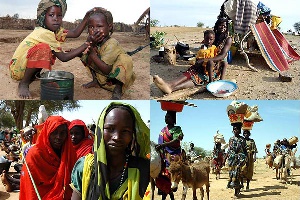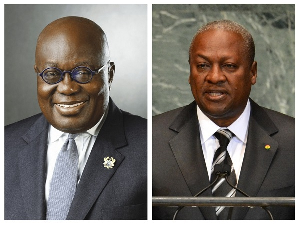The United Nations High Commissioner for Refugees, on World Refugee Day, said the number of refugees, asylum-seekers and internally displaced persons has for the first time in the post-World War II era, exceeded 50 million.
The United Nations High Commissioner for Refugees’ (UNHCR's) annual Global Trends report, which is based on data compiled by governments and non-governmental partner organisations, and from the organisation's own records, shows 51.2 million people were forcibly displaced at the end of 2013, fully six million more than the 45.2 million reported in 2012.
The report dubbed: “War’s Human Cost,” which was published on Friday as part of activities marking World Refugee Day was made available to Ghana News Agency by UNHCR.
It observed that the massive increase in refugees’ population was driven mainly by the war in Syria, which at the end of last year had forced 2.5 million people into becoming refugees and made 6.5 million internally displaced.
According to the report, major new displacement was also seen in Africa, notably in Central African Republic and South Sudan.
"We are seeing here the immense costs of not ending wars, of failing to resolve or prevent conflict," said UN High Commissioner for Refugees António Guterres. "Peace is today dangerously in deficit. Humanitarians can help as a palliative, but political solutions are vitally needed. Without this, the alarming levels of conflict and the mass suffering that is reflected in these figures will continue.”
The report said the worldwide total of 51.2 million forcibly displaced represents a huge number of people in need of help, with implications both for foreign aid budgets in the world's donor nations and the absorption and hosting capacities of countries on the front lines of refugee crises.
The High Commissioner said: "The international community has to overcome its differences and find solutions to the conflicts of today in South Sudan, Syria, Central African Republic and elsewhere. Non-traditional donors need to step up alongside traditional donors. As many people are forcibly displaced today as the entire populations of medium-to-large countries such as Colombia or Spain, South Africa or South Korea.”
The report said the displacement data in the annual report covers refugees, asylum-seekers and the internally displaced.
Among these, refugee numbers amounted to 16.7 million people worldwide, 11.7 million of whom are under UNHCR's care, and the remainder registered with the UN Relief and Works Agency for Palestine.
It said these totals alone are the highest UNHCR has seen since 2001, in addition, more than half of the refugees under UNHCR's care (6.3 million) had at the end of 2013 been in exile for more than five years.
It said overall, the biggest refugee populations under UNHCR care and by source country are Afghans, Syrians and Somalis – together accounting for more than half of the global refugee total.
It said by region, Asia and the Pacific had the largest refugee population overall at 3.5 million people, Sub-Saharan Africa had 2.9 million people, while the Middle East and North Africa had 2.6 million.
The reported pointed out that in addition to refugees, 2013 saw 1.1 million people submitting applications for asylum, the majority of these in developed countries, with Germany becoming the largest single recipient of new asylum claims.
It said a record 25,300 asylum applications were from children who were separated from or unaccompanied by parents.
Internal displacement – people forced to flee to other parts of their country, amounted to a record 33.3 million people, accounting for the largest increase of any group in the Global Trends report.
The report said 2013 saw the fourth lowest level of refugee returns in almost a quarter century – 414,600 people, adding that some 98,400 refugees were resettled in 21 countries.
It noted that the worldwide population of stateless people is not included in the figure of 51.2 million forcibly displaced people (since being stateless doesn't necessarily correlate to being displaced).
The report said statelessness remains hard to quantify with precision, but for 2013, UNHCR's offices worldwide reported a figure of almost 3.5 million stateless people, which is about a third of the number of people estimated to be stateless globally.











